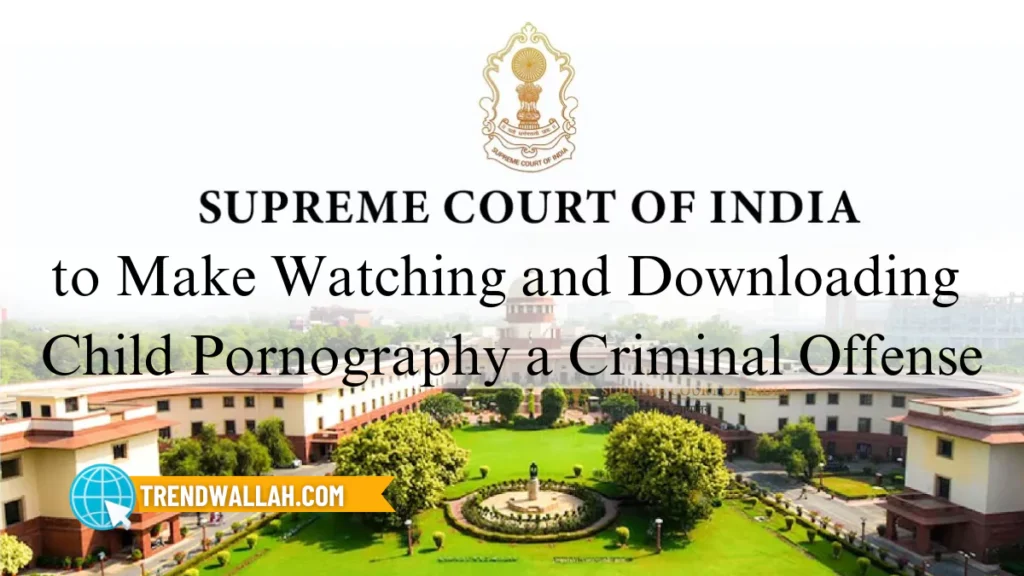
Child Pornography Laws- The state government announced that watching and downloading child pornography will soon be a criminal offense, following the Supreme Court’s recent ruling on the matter. This decision highlights the growing focus on child protection and stricter laws against the exploitation of minors.
Supreme Court Ruling on Child Pornography Laws
On Monday, the Supreme Court set aside a previous ruling by the Madras High Court, which claimed that merely downloading or watching child pornography is not a criminal offense. The Supreme Court declared that possession and consumption of such material should be treated as a serious crime. In a key recommendation, the court urged Parliament to replace the term “child pornography” with “Child Sexual Exploitative and Abuse Material” (CSEAM) in all laws. This shift in terminology is expected to better address the issue of child exploitation.
The Need for Stronger Child Protection Laws
The Supreme Court’s ruling comes after a controversial decision by the Madras High Court earlier this year. The high court had ruled that simply watching or downloading child pornography without directly participating in its creation was not a crime under the Protection of Children from Sexual Offenses (POCSO) Act or the Information Technology (IT) Act. However, the Supreme Court disagreed with this interpretation, stating that any interaction with such exploitative content is harmful and must be addressed seriously.
Government’s Zero-Tolerance Policy
The Women and Child Development department welcomed the Supreme Court’s decision, stating that it reinforces the responsibility of citizens to protect children. The state government has pledged to enhance coordination with law enforcement agencies to combat the dissemination and consumption of child pornography. Task forces will be established to investigate and prosecute these offenses, demonstrating the government’s zero-tolerance policy towards child sexual exploitation.
Impact on National Laws
The Supreme Court’s ruling has significant implications for both national and international child protection efforts. By updating legal definitions and strengthening penalties, India is aligning itself with global standards for protecting children. This change is expected to encourage other countries to review their own laws related to child exploitation.
Table: Key Developments in Child Pornography Laws
| Event | Details |
| Supreme Court Ruling | Watching and downloading child pornography declared a crime |
| Legal Terminology Change | Urged to replace “child pornography” with “CSEAM” |
| Government Action | Task forces to combat child sexual exploitation |
| Impact on National and International Laws | Strengthening laws to align with global child protection standards |
| Support for Victims | Comprehensive care services for victims of child abuse to aid recovery |
Key Aims of the New Child Pornography Law/ Policy
The main goals of the new policy are:
- Strengthen laws against child sexual exploitation.
- Ensure better enforcement and prosecution of offenders.
- Provide comprehensive support services for victims of child abuse.
- Shift public perception and legal definitions from “child pornography” to “CSEAM.”
Summary of Child Pornography Laws and Decisions
- The Supreme Court has ruled that downloading and watching child pornography is a crime.
- The court urged Parliament to replace the term “child pornography” with “CSEAM.”
- The state government plans to improve coordination with law enforcement to combat child exploitation.
- New task forces will be set up to investigate and prosecute related crimes.
- The ruling emphasizes the importance of child protection laws and the responsibility of all citizens to report suspicious activities.
Also Read- India Becomes Asia’s 3rd Most Powerful Country: Asia Power Index 2024
The court ruled that downloading and watching child pornography is a criminal offense.
The court recommended replacing “child pornography” with “Child Sexual Exploitative and Abuse Material” (CSEAM).
The Madras High Court ruled that watching child pornography without direct involvement was not a crime, but the Supreme Court disagreed.
The government will set up task forces to investigate and prosecute crimes related to child pornography and exploitation.
This decision will strengthen child protection laws and ensure stricter penalties for offenders.
